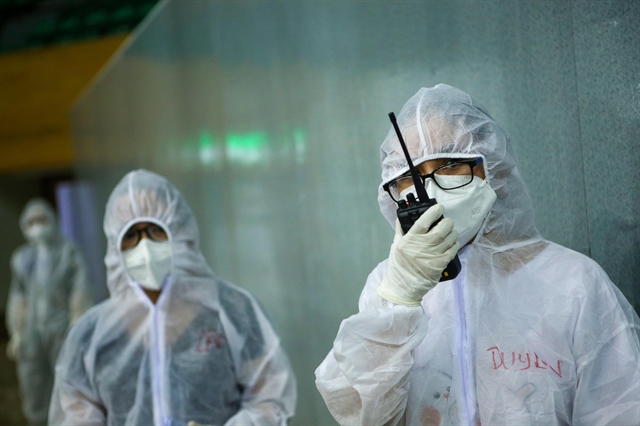Health officials urge public to learn to 'co-habit with the virus'
Health officials have urged members of the public to change their habits to cohabit with the virus after the return of COVID-19 community transmission.
 |
| Health workers communicate in Tien Son field hospital set up to test and treat COVID-19 cases in Da Nang, Viet Nam's current coronavirus epicentre. — VNA/VNS Photo Tran Le Lam |
Officials and experts shared the sentiment as the National Steering Committee for COVID-19 Prevention and Control met on Friday morning in Ha Noi, as Viet Nam is trying to contain the outbreak in the central region, which ended the country’s streak of 99 days without community cases in late July.
Deputy Prime Minister and head of the committee Vu Duc Dam said “we can no longer expect that the entire country is virus-free,” since the threats of a disease outbreak are ever-present nationwide.
“We have to encourage the people to practise anti-epidemic hygiene and safety measures, and the message now is to co-habit safely with the virus,” Dam said, stressing Viet Nam’s COVID-19 strategy is one of a “poor country” which relies on buy-in from the whole community to limit the number of infections.
Dam said in recent times, in many localities, both the people and administration have shown “complacence".
Dam said the alert level must be raised, calling for people to strictly abide by recommendations like avoiding going out if not necessary, wearing masks in public, washing hands and maintaining a safe distance.
“This is not just a responsibility of each individual to themselves, but also a duty to their family, to society and the country,” he said.
Over the past few days health authorities recorded new COVID-19 cases in the northern province of Hai Duong, with no known links to Da Nang, which has caused public alarm and forced Hải Dương City with a half-a-million population to go into a 15-day lockdown.
The health ministry is analysing the virus samples from infected people to see if it is the same strain that is spreading in the central region.
Vaccine or cure needed
The committee’s members reiterated there’s no end in sight to the pandemic until an effective medicine or vaccine is obtained.
Vu Tuan Cuong, Director-General of the Drug Administration of Viet Nam, confirmed to local media the department is waiting for a decision from the health ministry on whether to purchase the recently-approved COVID-19 vaccine named Sputnik V from Russia.
Acting Minister of Health Long reportedly said Viet Nam and the Russian Embassy have had talks over ordering 50-100 million doses of the world’s first COVID-19 vaccine.
Local newspaper said Russia might supply part of the order placements as ‘gifts', while the rest would be purchased by Viet Nam, however, the timing of the purchase remains unknown as there are a lot of procedures involved.
The Russian Embassy in Viet Nam has not yet commented on the issue.
However, health officials stressed it would take several months for the vaccine to be available in Viet Nam as this depends heavily on the manufacturer’s output capacity and whether the vaccine satisfies Vietnamese legal requirements on trials.
Meanwhile, Viet Nam will continue developing its own COVID-19 vaccines to be self-reliant in its distribution to the 90 million population.
The health ministry will send two vaccine candidates, slated to be available by the end of 2021, by the Institute of Vaccines and Medical Biologicals and Vaccine and Biological Production No.1 Company (Vabiotech) under the Ministry of Health, to be tested in the US after pre-clinical trials on animals yielded promising results.
Management of foreign entry
Health ministry, foreign ministry and defence ministry representatives asked that all localities be stricter in managing foreign entries into the country – currently limited to experts, investors and highly skilled workers – especially in terms of quarantine and hygiene.
They have also suggested measures that other countries are using, including performing quick tests to screen all arrivals upon landing, or electronic devices like wristbands or bracelets to track foreign entries’ whereabouts during the quarantine.
The public security ministry said it is investigating alleged illegal immigration rings that exploit the policy to allow selected investors and experts to enter the country from abroad.
Source: VNS